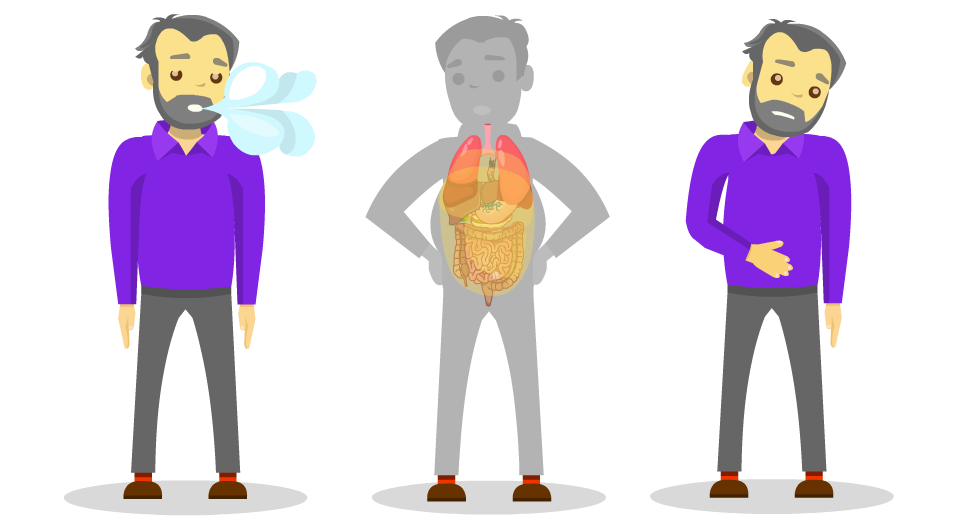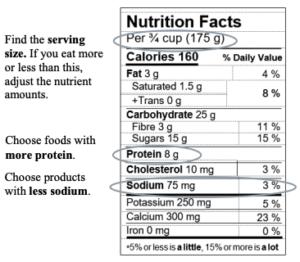When to Get Help
Contact your healthcare provider right away, go to the nearest emergency department, or have someone call 911 if you have:
- trouble breathing
- sharp pain in your chest that doesn’t go away
- a fever
- nausea and vomiting
What is Pleural Effusion?
Pleural effusion (or hepatic hydrothorax) is the buildup of fluid in the space between the lungs and the chest wall (called the pleural space). When fluid builds up in the pleural space, the lungs may not be able to expand completely. This can make it hard to breathe. The lung, or part of it, may also collapse.
In cirrhosis, pleural effusion is cause by high pressure in the portal vein (called portal hypertension). In many cases, the fluid build up starts in the abdomen (ascites) but eventually passes through holes in the diaphragm, into the chest (pleural effusion).
Symptoms of pleural effusion can include:
- chest pain
- cough
- trouble breathing or shortness of breath
Pleural effusion is usually diagnosed with a physical exam and tests like a chest X-ray or CT scan. To help find out what caused the fluid to build up, your doctor may also order bloodwork or lab tests on a sample of the fluid from around your lungs.

Treatment
A very small pleural effusion may not cause any symptoms or need to be treated. In other cases where the pleural effusion is causing symptoms or there is concern about infection, treatment may be needed.
Low Sodium (Salt) Diet
Too much sodium can make your body hold on to extra fluid. This fluid can pool in your belly, chest and legs. Eating foods with less sodium can help control fluid build up.
- Aim to eat less than 2000 mg of sodium a day.
- One teaspoon of salt has about 2300 mg of sodium.
- All types of salt contain the same amount of sodium, including table salt, sea salt, and Himalayan salt.
Tips to reduce sodium:
- At first, foods may taste bland. Over time, your taste buds get used to less salt.
- Don’t add salt to your food while cooking or at the table.
- Choose fresh, unprocessed, and homemade foods.
- Eat less processed, packaged, or restaurant foods.
- Limit condiments and sauces (ketchup, mustard, soy sauce, gravies, salad dressings).
- Limit pickled foods, olives, chutneys, and dips.
- To boost flavours, try adding spices, seasoning mixes with no salt added, lemon, lime, vinegar, fresh or dry herbs, garlic, or onions
Read food labels
Diuretic Medicines
Diuretic medicines such as furosemide and spironolactone can also help to get rid of the fluid that has built up around your lungs and other parts of the body. They help to both prevent and treat problems with pleural effusion.
If you are taking diuretics, it is important to weigh yourself daily to monitor the effect of diuretics. One litre of pleural fluid weighs about 2.2 pounds (1 kg). Gradual weight loss is a sign of decreasing pleural effusion – this is expected and desired when diuretics are first started. Losing weight too quickly can be dangerous.
You should also have your blood work checked as recommended by your healthcare team because diuretics can effect your kidneys and electrolyte levels. Your dose of diuretics can be adjusted by your healthcare team if you are losing weight too quickly, having side effects, or they don’t seem to be working.
Let your healthcare team know if you are experiencing:
- dizziness
- a decrease in urination
- confusion or sleepiness
- have ongoing or worsening trouble with breathing
- are losing weight too quickly: 2 pounds (0.9 kg) or more in a day, for 2 days in a row, OR more than 7 pounds (3.2 kg) in a week
Thoracentesis
Thoracentesis is a procedure used to drain pleural fluid.
Sometimes thoracentesis is used to take a sample of the fluid for determining why it’s building up. Thoracentesis might also be used if you have cirrhosis and the following circumstances:
- You have a large amount of pleural fluid. It’s causing extreme discomfort and difficulty breathing. A thoracentesis may relieve these symptoms before you begin treatment with one or more diuretics.
- You haven’t responded to a low-salt diet and diuretic medicines, or your body is unable to tolerate diuretic medications. In this situation, you may require thoracentesis repeatedly.
- Your doctor suspects the fluid is infected.
Other Treatments
Your healthcare team may recommend other treatment options. Options available to you will depend on lots of different factors like your age, other medical conditions and how sick your liver is. Some other treatment options might include:
- Transjugular intrahepatic portosystemic shunt (TIPS). This procedure that involves inserting a shunt to decrease portal hypertension by redirecting blood flow around the liver.
- Liver transplant. This is a major surgery where your liver is removed and replaced with a donor liver.
- Indwelling pleural catheter. This is a special type of catheter that’s left in place for ongoing fluid drainage.
Self Care Tips:
If you’re being treated for pleural effusion:
- weigh yourself each morning before breakfast, before you drink anything or take medicine, and after you pee (urinate).
- Keep track of your weight in a notebook or app on your phone. Most people will see changes in weight readings, even before they notice changes in how their abdomen looks or feels.
- If you are taking diuretics (water pills), have your blood tests done regularly to check your kidneys and electrolytes as recommended by your health team.
Let your healthcare provider know if you:
- are losing weight too quickly: 2 pounds (0.9 kg) or more in a day, for 2 days in a row, OR more than 7 pounds (3.2 kg) in a week
- gain 2 pounds (0.9 kg) or more in a day, for 2 days in a row, OR gain 5 pounds (2.3 kg) in a week
References:
The information on this page was adapted (with permission) from the references below, by the Cirrhosis Care Alberta project team (physicians, nurse practitioners, registered nurses, registered dietitians, physiotherapists, pharmacists, and patient advisors).
This information is not intended to replace advice from your healthcare team. They know your medical situation best. Always follow your healthcare team’s advice.
References:


